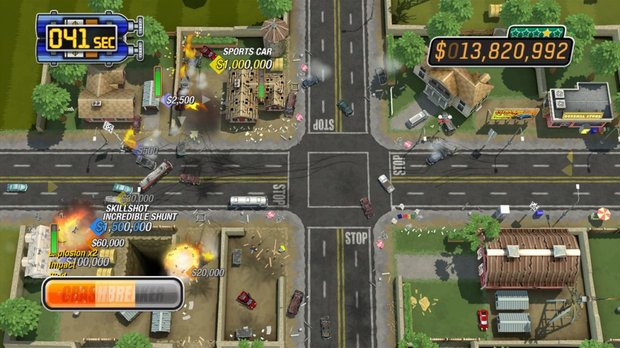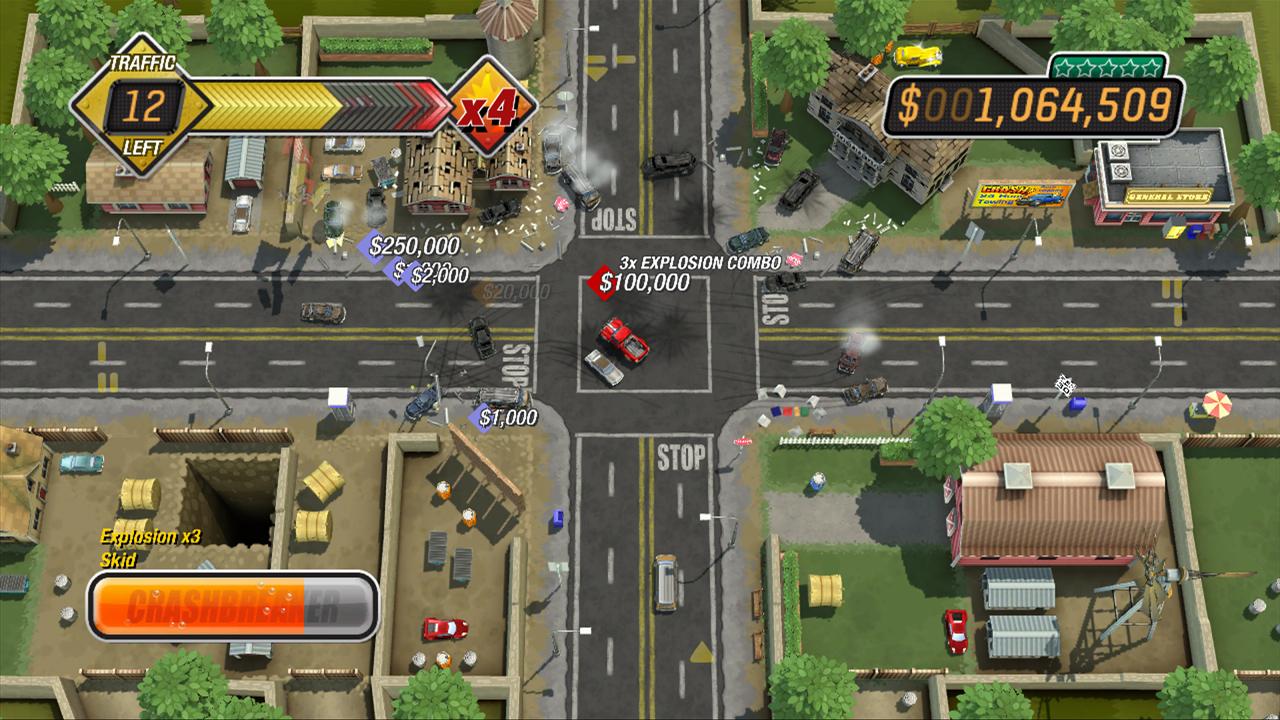GamesRadar+ Verdict
Pros
- +
Explosive
- +
utterly chaotic action
- +
Elements of pinball
- +
tower defense
- +
Peggle
- +
Addictive score-chasing bolstered by Autolog support
Cons
- -
Short on content
- -
Occasionally frustrating trial-and-error
- -
Floaty driving physics
Why you can trust GamesRadar+
Given that Crash is a Burnout game, it's tempting to unceremoniously chuck it into the scrapyard for everything it's not. It doesn't use the same crunchy, visceral viewpoint as other Burnouts. It doesn't concern itself with obsessively detailed vehicular destructo-porn. There aren't any neck-and-neck photo finishes or spark-scattering takedowns that'd look right at home in every Hollywood automotive thriller not titled “Cars.” Crash isn't Burnout 6 or Paradise 2. It is, however, still pretty damn fun.
So then, what is Burnout Crash? Well, we're all about razor's edge precision, so we're going to use the most scientific form we know: a cliched joke framework. Burnout Crash feels like the result of some Criterion staffer kicking off a meeting with “So tower defense, pinball, and explosions walked into a bar...” But instead of laughing derisively and sending him to the Shame Corner, everyone else glanced at him incredulously and said, “That's... brilliant!” Because it sort of is. Well, mostly.

Above: Yeah, nearly $14,000,000 in property damages is only worthonestar
Crash's basic mechanics are almost absurdly simple. You pilot your micro machine a fittingly tiny distance into a crowded intersection and – KABOOM – nature takes its course. However, that's only the beginning. While Burnout 3 – the previous series entry Crash is most heavily influenced by – was all about the improbably obstacle-laden setup, Crash shows its true colors after you become a soaring pile of flaming metal death.
Racking up points, you see, is as simple as waiting for your giant, glowing Crashbreaker meter to fill and then exploding again. And again. And again. And so on. That's where the pinball element comes in. If you time your not-so-spontaneous combustions correctly, you can put together giant combo multipliers capable of decimating an entire town block and skyrocketing your score into goddamn Valhalla. Combined with everything from magical roving roulette pizza trucks to the occasional meteor shower to freaking UFOs, it's pure insanity.
Crash isn't just some mindless pyrotechnics show, though. Also making a return from Burnout 3 is “aftertouch,” which allows you to briefly guide your ticking time bomb on wheels after every detonation. Here, then, the tower defense comparison becomes apt. See, it's generally not a good idea to let other cars flee from your glorious realization of Michael Bay's wildest dreams. In the main Road Trip mode, it's even the central factor in deciding whether you succeed or fail. Problem is, there are far too many cars for you to leapfrog between all of them. So instead, you have to carefully plan your explosions such that they create barriers out of flaming car husks. As a result, other cars – apparently driven by people who got their driver's licenses from boxes of Cracker Jacks that were recalled because they caused incredible blindness – swerve and screech right into your makeshift defenses, reinforcing them in the process.
Therein, however, lies the rub: You score points by blowing everything to smithereens. Car fortresses, though, only stop vehicles dead in the their tracks. Often, it comes down to timing. Should you continue bouncing around and picking off cars while your barriers do the bulk of the heavy lifting? Or should you send every nearby car careening into whatever building's lucky enough to still be standing, resulting in a colossal combo payday but annihilating your defenses? It's your call. Regardless, that constant dilemma adds a surprisingly intense layer of on-the-fly strategy to the proceedings.
Even so, Crash won't exactly have your brain firing on all cylinders. Sure, there are other factors to consider – for instance, the direction and flow of traffic, bonuses like money transport trucks, and level-specific features that can obliterate everything around you in the blink of an eye – but Crash definitely isn't overwhelmingly complex. In fact, if we had to give it a label, it'd be “Easy to learn, hard to master.” What really makes it stand out from other tiny timewasters, then, is the fact that it combines these addictive, deceptively involving mechanics with such satisfying results. We can't stress this enough: Shit blows up. Like, all the time. Causing massive chain reactions that engulf the entire screen simply feels wonderful. In spite of the fact that we were essentially doing the same thing over and over again, that maniacally destructive appeal kept us glued to our seat for hours.
More info
| Platform | "PS3","Xbox 360","PC" |
| US censor rating | "Everyone 10+","Everyone 10+","" |
| UK censor rating | "","","" |
| Release date | 1 January 1970 (US), 1 January 1970 (UK) |



